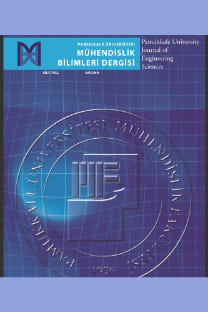Orta Anadolu’da kabuğa ait sismik P ve S dalga hızı yapısının belirlenmesi
P ve S dalga hızları, Sismik tomografi, Orta Anadolu, Sismik hız
Determination of seismic P and S wave velocity structure of crust in Central Anatolia
___
- Iyer HM. “A review of crust and upper mantle structure studies of the Snake River plain-yellow stone volcanic system: A major lithospheric anomaly in the western USA”. Tectonophysics, 105(1-4), 291-308, 1984.
- Akyol N, Zhu L, Mitchell BJ, Sözbilir H, Kekovalı K. “Crustal structure and local seismicity in western Anatolia”. Geophysical Journal International, 166(3), 1259-1269, 2006.
- Lei J, Zhao D. “Telesismic P-wave tomography and the upper mantle structure of the central Tien Shan orogenic belt”. Physics of the Earth and Planetary Interiors, 162(3), 165-185, 2007.
- Salah MK, Şahin Ş, Topatan U. “Crustal velocity and Vp/Vs structures beneath central Anatolia from local seismic tomography”. Arabian Journal Geosciences, 7(10), 4101-4118, 2014.
- Salah MK, Şahin Ş, Aydin U. “Seismic velocity and Poisson’s ratio tomography of the crust beneath east Anatolia”. Journal of Asian Earth Sciences, 40(3), 746-761, 2011.
- Çıvgın B, Kaypak B. ‘‘Estimation of the crustal structure in Central Anatolia (Turkey) using receiver functions’’. Turkish Journal of Earth Sciences, 26, 314-330, 2017.
- Bozkurt E. “Neotectonics of Turkey - a synthesis”. Geodinamica Acta, 14, 3-30, 2001.
- Maden Tetkik Arama Genel Müdürlüğü. “Türkiye Diri Fay Haritası”. Ankara, Türkiye, 2013.
- Boğaziçi Üniversitesi, Kandilli Rasathanesi ve Deprem Araştırma Enstitüsü, “Türkiye Deprem Verileri Kataloğu”. İstanbul, Türkiye, 2018.
- Zhao D, Hasegawa A, Horiuchi, S. “Tomographic imaging of P- and S-wave velocity structure beneath north eastern Japan”. Journal of Geophysical Research, 97, 19909-19928, 1992.
- Çevikbilen S, Biryol CB, Beck S, Zandt G, Taymaz T, Adıyaman HE, Özacar A. “3-D structure along the North Anatolian Fault Zone in North-Central Anatolia revealed by local earthquake tomography”. Geophysical Journal International, 188(3), 819-849, 2012.
- Um J, Thurber C. “A fast algorithm for two-point seismic ray tracing”. Bulletin Seismological Society of America, 77, 972-986, 1987.
- Zhao D, Hasegawa A, Kanamori H. “Deep structure of Japan subduction zone as derived from local, regional and teleseismic events”. Journal of Geophysical Research, 99, 22313-22329, 1994.
- Thurber CH, Aki K. “Three-dimensional seismic imaging”. Annual Review of Earth and Planetary Sciences, 15, 115-139, 1987.
- Salah MK, Şahin Ş, Destici C. ‘‘Seismic velocity and Poisson’s ratio tomography of the crust beneath southwest Anatolia: an insight into the occurrence of large earthquakes’’. Journal of Seismology, 11, 415-432, 2007.
- Farouk M, Zhao D. “Tomo tools programme for Windows V 1.0”. Geodynamics Research Center (GRC), Ehime University, Japan, Scientific Report, 1, 2006.
- Hearn TM, Ni J. “Pn velocities beneath continental collision zones: the Turkish-Iranian Plateau”. Geophysical Journal International, 117(2), 273-283, 1994.
- Rodgers AJ, Ni JF, Hearn TM. “Propagation characteristics of short period Sn and Lg in the Middle East”. Bulletin Seismological Society of America, 87(2), 396-413, 1997.
- Saunders P, Priestley K, Taymaz T. “Variations in the crustal structure beneath western Turkey”. Geophysical Journal International, 134(2), 373-389, 1998.
- Al-Lazki AI, Sandvol E, Seber D, Barazangi M, Turkelli N, Mohamad R. “Pn tomographic imaging of mantle lid velocity and anisotropy at the junction of the Arabian, Eurasian and African plates”. Geophysical Journal International, 158(3), 1024-1040, 2004.
- Tezel T, Erduran M, Alptekin Ö. “Crustal shear wave velocity structure of Turkey by surface wave dispersion analysis”. Annals Geophysics, 50(2), 177-190, 2007.
- Erduran M, Çakir Ö, Tezel T, Şahin Ş, Alptekin Ö. “Anatolian surface wave evaluated at GEOFON station ISP Isparta, Turkey”. Tectonophysics, 434(1), 39-54, 2007.
- Meier T, Dietrich K, Stöckhert B, Harjes HP. “One-dimensional models of shear wave velocity for the eastern Mediterranean obtained from the inversion of Rayleigh wave phase velocities and tectonic implications”. Geophysical Journal International, 156(1), 45-58, 2004.
- Karagianni EE, Papazachos CB, Panagiotopoulos DG, Suhadolc P, Vuan A, Panza GF. “Shear velocity structure in the Aegean area obtained by inversion of Rayleigh waves”. Geophysical Journal International, 160(1), 127-143, 2005.
- Pasyanos ME. “A variable resolution surface wave dispersion study of Eurasia, North Africa, and surrounding regions”. Journal of Geophysical Research, 110(B12301), 1-22, 2005.
- Maggi A, Priestly K. “Surface waveform tomography of the Turkish-Iranian plateau”. Geophysical Journal International 160(3), 1068-1080, 2005.
- Bilim F. “Investigating Moho depth, Curie Point, and heat flow variations of the Yozgat Batholith and its surrounding area, North central Anatolia, Turkey, using gravity and magnetic anomalies”. Turkish Journal of Earth Sciences, 26, 410-420, 2017.
- Arslan S, Akın U, Alaca A. “Investigation of Crustal Structure of Turkey by Means of Gravity Data”. Bulletin of the Mineral Research and Exploration, 140(140), 55-71, 2010.
- Akın U. “Gravite Verilerinden Türkiye’nin Sismik Hız dağılımı ve Kabuk Yapısının Ortaya Çıkarılması”. Maden Tetkik ve Arama Dergisi, 153,185-202, 2016.
- Ateş A, Bilim, F. Büyüksaraç A, Aydemir A, Bektaş Ö, Aslan Y. “Crustal structure of Turkey from aeromagnetic, gravity and deep seismic reflection data”. Surveys in Geophysics, 33(5), 869-885, 2012.
- ISSN: 1300-7009
- Yayın Aralığı: 7
- Başlangıç: 1995
- Yayıncı: PAMUKKALE ÜNİVERSİTESİ
Akdeniz Bölgesinde kuraklık analizi
Ülker GÜNER BACANLI, Gözde Nur AKŞAN
Anaerobik çürütme prosesi ile stabilize edilen arıtma çamurları için modeller ve ADM1
Murat Mert OTUZALTI, Nuriye ALTINAY PERENDECİ
İstatistiksel yaklaşım kullanarak heterojen foto-Fenton benzeri oksidasyon ile atrazin arıtımı
Murat ÇELİKER, Osman YILDIZ, Nilüfer NACAR KOÇER
Ertuğrul Türker UZUN, Mutlu SEÇER
Hasanoğlan (Ankara) petrol sisteminin organik hidrojeokimyasal kanıtları
